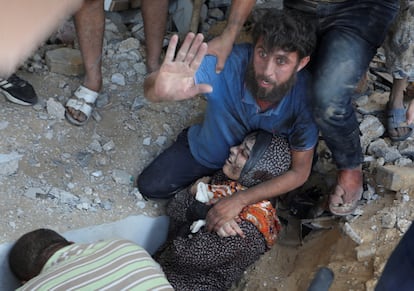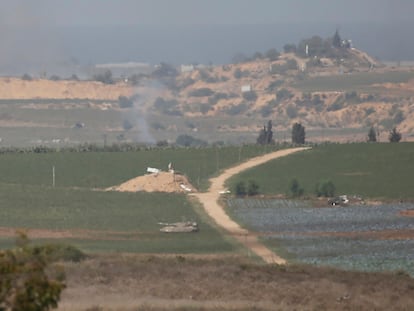Heartbreaking testimonies from an isolated and starving Gaza: ‘We are living like animals’
Palestinians who stayed in the north and those who moved south of the enclave describe their increasing helplessness since the communications blackout on Friday night, when Israel’s ground invasion began

“On Friday night, when we completely lost all connections and the Israeli bombardment was much more frequent and heavy, we thought our time had come and we spent hours praying,” says 73-year-old Salah Awad El Sousi, describing his feelings after communications were cut off in Gaza when the Israeli army began its ground invasion. EL PAÍS has been speaking with this retired doctor of pharmacy, who has a Spanish passport, on an almost daily basis. He and his family moved towards the Egyptian border after their house in Gaza was bombed, in the hope of being evacuated to Madrid, but so far no one has left Gaza, regardless of their nationality.
El Sousi left Gaza City with almost nothing but the clothes on his back. As the days passed, and his family remained stuck in the south, one of his sons returned to the ruins of their house to look for clothes in the rubble. “My office, my books, my degrees and all our memories were buried there,” laments El Sousi, before recovering his spirits as best he can. “But we are still in contact with the Spanish consulate in Jerusalem, and they are negotiating to get us out safely.” For now, he and his family are living with 40 other people, 20 of them minors, in the apartment of a distant relative. He won’t say where. “The only thing that matters is that Israel made us believe that the south was a safe place, and it is not,” he says.
The man describes daily life in Gaza since the Israeli siege began. The scenes seem to belong to another era: they make a fire with the wood they find and use it to bake bread, although flour is already starting to become scarce. They prioritize giving food and water to children, and the adults are already feeling the effects of hunger and dehydration. Some young people go out “in the neighborhood” to buy something if there is a store open. And every morning, they cross their fingers and hope that the sun is out, so they can charge their cellphones thanks to small homemade panels. “We are still alive, but it’s a miracle. We have lived nights of terror,” he says.
Since Sunday, phone and internet connectivity in Gaza has been progressively recovered, although contacting people within Gaza is becoming more complicated every day, due to the lack of electricity and the fact that some places have no coverage at all. Sent messages spend hours, or even days, in a vacuum, unable to be delivered to their recipients. Those that are received and read are replied to in an increasingly brief manner. There are no voice notes or videos because there is not enough signal.
“Fear dominates everything and prevents us from thinking clearly. We have lost track of time, but the hours pass with one goal: to stay alive.” Remah Ahmed’s messages sent on WhatsApp are brief and stop and start as the internet connection goes out. He does not want to waste his precious cellphone battery, but he makes an effort to describe in as much detail as possible how he survives in Khan Yunis, south of Gaza, where he is sheltered in a friend’s house, with his wife and two children, ages 17 and 19, along with 40 other people, most of whom were strangers until a few days ago.
“I can’t sleep due to the bombardments, which are getting heavier and heavier, and because of my thoughts, which constantly worry me. It’s dawn and the first question is: am I going to die today or will I be lucky?” There is nothing exaggerated in the question of this 50-year-old man, who used to work as a Palestinian Authority official in Gaza. More than 8,300 Palestinians have been killed by Israeli bombs since the offensive began, according to figures from Gaza’s Health Ministry. The disbelief, despair, terror, exhaustion and sense of abandonment conveyed by Gaza inhabitants in their messages are growing. The days go by and the Israeli offensive advances and intensifies, while they feel cornered in a trap, one that is increasingly oppressive and unsafe.
“There is not a moment’s calm. Even the simplest thing has become a huge problem: how to get food, water or a bit of electricity to charge your cellphone. We are living like animals, and we have become numbers: numbers of dead, numbers of injured, numbers in the lines to buy some bread...,” says the 50-year-old man.
Israel has once again warned residents of the northern part of Gaza to go south “for their own safety.” In the past two weeks, tens of thousands of Palestinians have left their homes and taken refuge in the homes of friends, relatives or U.N. schools in towns such as Rafah and Khan Younis. According to the United Nations Office for the Coordination of Humanitarian Affairs (OCHA), around 1.4 million Gazans have been displaced, some of them several times since October 7. But in the northern part, closer to Israel, there are still many people who are unwilling or unable to flee. Among them are the wounded, the sick, humanitarian workers, medical personnel, the disabled, the elderly, pregnant women and children, according to the Palestinian humanitarian organizations Al Mezan, Al-Haq, and the Palestinian Center for Human Rights (PCHR).
“There are also no guarantees of safety and security in the south, where Israel continues its relentless bombing campaign. This suggests that Israel’s evacuation orders are not issued for the safety of the civilian population, but rather, are intended to forcibly displace hundreds of thousands of Palestinians to move them closer to the border with Egypt,” the organization argue in a joint statement.
Remah Ahmed also felt that there was no safe place in all of Gaza, but he saw his neighbors fleeing towards the south and followed them. His sister decided to stay in Gaza City, with her husband and four children. “She said she preferred to die at home,” he explains. “We arrived first at a U.N. school, which was packed. There was garbage everywhere, they had no water or food or bathrooms... People were living like animals. Finally, we ended up at this acquaintance’s house,” he explains. On Monday, the United Nations Agency for Palestinian Refugees (UNRWA) reported that it is sheltering 672,000 people in its facilities in Gaza, a figure four times its capacity. Conditions at the shelters are becoming “increasingly desperate,” they warned. Now, even if Remah Ahmed would like to return to the north, he has nowhere to go, because his house was bombed days after the family left.
“What will change if I use my connection and my battery to tell you how we are living? Is the world going to do something? What are you waiting for?” says Kholoud Sayed, sounding exasperated. EL PAÍS has been in contact with this university professor since October 7. She, her husband and her three children have been in Rafah, the southernmost city of Gaza, for two weeks. They are staying with a relative, but they no longer have gas and are struggling to find bread and drinking water.
Raji Sourani, a well-known lawyer and director of the PCHR was “miraculously” unharmed after his house in Gaza City was bombed on 21 October, and has not even received WhatsApp messages for a week. “We are on the good side of history, defending a just cause and we are not going to be good victims. I am still in Gaza City, in a relative’s house, and I will not leave here because there is no safe place in all of Gaza. This is like a lottery. Israel’s plan is clear: for Gazans to leave Gaza. But where?” he asks in his last message to this newspaper, sent on October 23.
Sign up for our weekly newsletter to get more English-language news coverage from EL PAÍS USA Edition
Tu suscripción se está usando en otro dispositivo
¿Quieres añadir otro usuario a tu suscripción?
Si continúas leyendo en este dispositivo, no se podrá leer en el otro.
FlechaTu suscripción se está usando en otro dispositivo y solo puedes acceder a EL PAÍS desde un dispositivo a la vez.
Si quieres compartir tu cuenta, cambia tu suscripción a la modalidad Premium, así podrás añadir otro usuario. Cada uno accederá con su propia cuenta de email, lo que os permitirá personalizar vuestra experiencia en EL PAÍS.
En el caso de no saber quién está usando tu cuenta, te recomendamos cambiar tu contraseña aquí.
Si decides continuar compartiendo tu cuenta, este mensaje se mostrará en tu dispositivo y en el de la otra persona que está usando tu cuenta de forma indefinida, afectando a tu experiencia de lectura. Puedes consultar aquí los términos y condiciones de la suscripción digital.









































